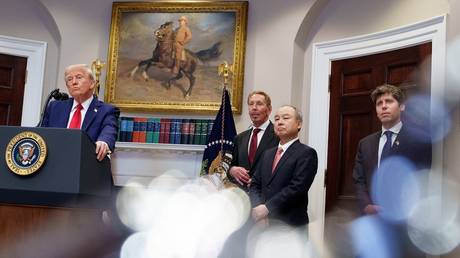ARTICLE AD BOX
Washington has opposed what it claims would be excessive regulation of the sector proposed during the Paris summit
The UK may not sign an international agreement on artificial intelligence (AI) after the US criticized the proposal over its excessive focus on regulation, Politico has reported, citing a senior British official who told the news outlet that Washington’s opinion on the issue cannot be ignored.
Speaking at the AI Action Summit in Paris on Tuesday, US Vice President J.D. Vance told delegates that too much regulation of the sector could “kill a transformative industry just as it’s taking off.”
“I’m not here this morning to talk about AI safety, which was the title of the conference a couple of years ago; I’m here to talk about AI opportunity,” Vance said, emphasizing that the US is planning “to make every effort to encourage pro-growth AI policies.”
British Technology Secretary Peter Kyle described the US as an “unignorable force and one that we engage with absolutely.” He added that the trends in AI are being set by the power of the technology itself, adding that America was adapting to those realities in the same way as the UK.
Discussions at the summit have focused on the impact of AI on society and the environment. Over 800 participants, including public and private sector partners, researchers, and NGOs debated how to capture the benefits and prevent risks related to the technology.
Read more Trump unveils $500 billion AI ‘Stargate’
Trump unveils $500 billion AI ‘Stargate’
The Guardian reported on Tuesday that the summit’s final communique on “inclusive and sustainable” AI was backed by 61 nations, including China, India, Japan, Australia and Canada. The declaration reportedly states that “ensuring AI is open, inclusive, transparent, ethical, safe, secure and trustworthy, taking into account international frameworks for all” and “making AI sustainable for people and the planet” are among priorities.
Shortly after taking office last month, US President Donald Trump revoked a 2023 executive order signed by his predecessor Joe Biden that sought to reduce the risks that artificial intelligence poses to consumers, workers and national security.
Last month, Trump announced the launch of a new initiative aimed at investing up to $500 billion in AI infrastructure. He described the project, which came as a result of a collaboration between US tech giants OpenAI and Oracle, and Japanese investment firm SoftBank, as a “monumental undertaking” and a “resounding declaration of confidence in America’s potential” that will ensure US leadership in the AI tech race against China and others.
Last month, China shocked the industry by releasing an AI assistant called DeepSeek, which has since become the most popular application on Apple’s US App Store, surpassing US-based OpenAI’s ChatGPT. The success comes despite the US using export controls to try to block Chinese firms from obtaining advanced micro-chips.
A number of countries, including Australia, South Korea, and Italy have prohibited the use of the app within their governmental operations, citing data-security concerns. In the US, the Navy and NASA have also blocked it due to privacy and security issues, while Congress proposed legislation last week to ban DeepSeek from all government-owned devices.
.png)
 3 hours ago
6
3 hours ago
6








 English (US)
English (US)